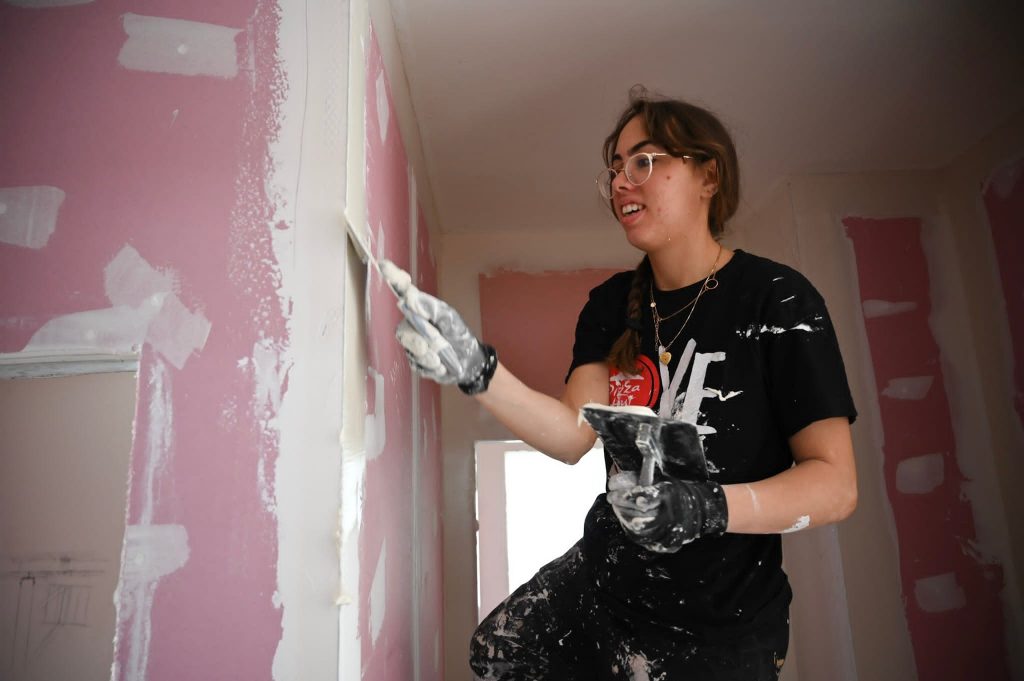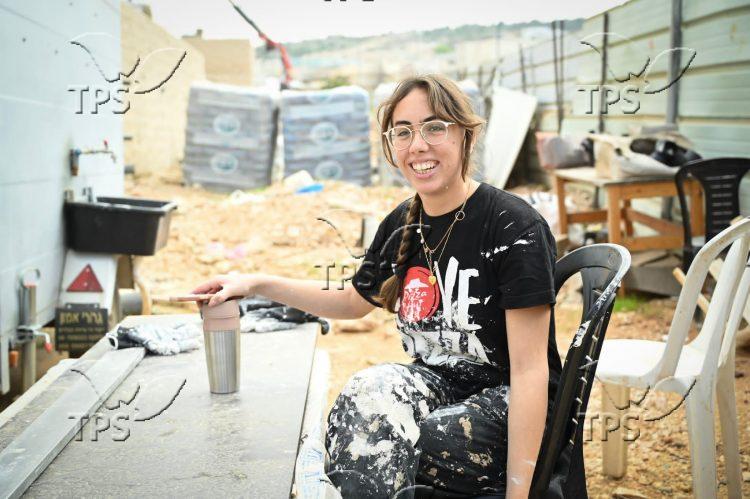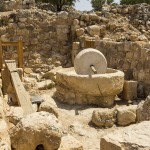Hard Hats and High Heels: Shirel Biggio Builds a New Future in Construction
Jerusalem, 7 March, 2024 (TPS) -- Everything looks normal on the construction site. The houses are nearing completion, though they are still without stairs. There’s dirt and noise everywhere. The construction workers sit down for a break, sighing with relief after being on their feet for a long time. The only thing unusual about the scene is their long nails and pink nail polish.
Shirel Biggio, 24, looks around the work site in the middle of Revava, a growing community in Samaria, and takes a drag from her cigarette.
“I started working in construction during COVID-19, after I finished my national service duty,” Biggio said. “I started to work with my father at summer vacations here and there. Then I began to like this profession and started to work permanently.”
That was four years ago.
“I’m actually from the fashion field, in my spare time I’m a stylist” she said, “I studied design and sewing, and not giving up the necklaces. When I come back from work, the first thing I do is kick off my boots and change into my heels. I work with clients. I have both worlds”.
Shirel, Lael, Selah and Sara, are the daughters of David Biggio, a contractor from Shvut Rachel who specializes in plastering.
“We called it ‘David and Daughters’, We have a motorcycle racer, horseback riding instructor, and an aerial acrobatics sportswomen, all working with dad,” said Shirel.

Shirel Biggio plasters a wall at a construction site in Revava, Samaria, on Feb. 25, 2024. Photo by Yoav Dudkevich/TPS
“The girls began to grow up and look for jobs,” David recalled. ”They used to clean, babysit and all kinds of jobs for young girls. In the end I suggested they come work with me. I told them you should try and see if it works for you. There is always a need for employees.”
The girls didn’t have a problem starting manual work, because they were also helping at home with their hands. “The most difficult part was the employers, who didn’t see it favorably at first,” David recalled.
David explained that the people in Samaria who prefer to hire Jewish workers are mostly religious, and were concerned about modesty.
“They didn’t want to accept this,” he said.
But that has changed.
“Today it’s the opposite,” David explained. “As soon as I get to the site with my daughters it upgrades the site. The guys see girls that work hard and fast- so it spurs them on.”
David stressed that work managers make sure there are separate bathrooms and changing areas for his daughters.
Shirel and her sisters have a TikTok page called “tzevet_biggio” where they publish satirical videos about life as female construction workers. “A lot of girls send me messages asking if they can join us as workers,” Shirel said.
“I believe that girls who are brave enough to say ‘No matter the job they give me, I’ll do everything and give the maximum,’ they are the type that will fit this kind of work. I was shocked in the beginning when my dad let me sand with a disc. There’s no connections, no favors,” she stressed.
Is construction work part of Shirel’s long-term plans?
“I will not stay long, It’s a hard job, physically and emotionally,” she acknowledged. “To get here everyday being dirty all day, wear dirty clothing, it’s not always easy. But I like it here and it makes me sad thinking of leaving it. I learned a lot here. I’m thinking ahead to build a project that will help women get into this work.”
Shirel insisted that construction work is more mentally engaging than most people realize.
“Most people think that you don’t need to work with your head when you build, It’s wrong. It’s a job where you really need to think and understand what will be the fastest safest way to do things.”
She added that building up the land of Israel is very important.
“Jewish people can work in construction work with their hands. It’s a different energy. It’s building our land with our hands and it’s empowering.”







